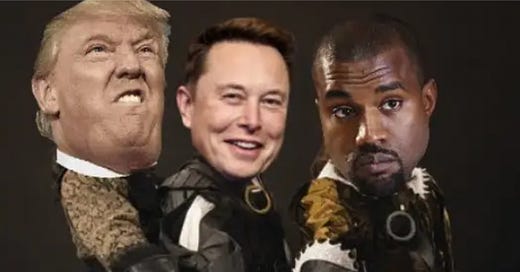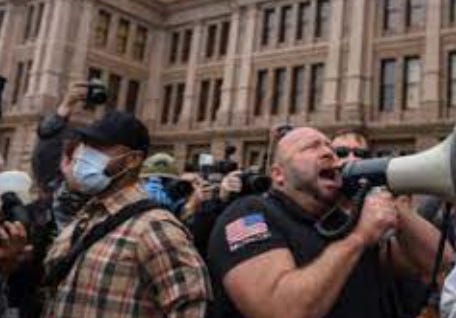For years, media “megaphones” have damaged and drowned out reasonable discourse, thanks to legal immunity granted to tech companies in 1996 by Washington. Silicon Valley lobbied for this protection on the basis that it would speed up the creation of a “free” marketplace of ideas online if companies were not liable for what users said or did. This spawned a Wild West internet filled with un-curated fraud, libel, propaganda, hate, bullying, violence, disinformation, and terrorism, and has created superstars with millions of followers. Now they consolidate. “Megaphone” Elon Musk owns Twitter, former President Donald Trump owns Truth Social, and rapper Kanye West, who’s spouted anti-semitic comments, owns Parler; and Musk just reinstated Trump and West on Twitter after both were kicked off for inciting violence, racism, and hate. And Musk himself has unleashed tweets that have smeared others, spread conspiracy theories, and violated securities laws. Clearly, European-style content regulation is needed, especially after Putin’s sidekick, and former President of Russia, Dmitry Medvedev, tweeted out his approval of Musk’s empire-building. “Good luck @elonmusk in overcoming political bias and ideological dictatorship on Twitter”.
Musk and others reject the notion of regulation as an abrogation of “freedom of speech” rights and regard curation as censorship. But both assertions are false. Freedom is the right to swing your arm, but not hit anyone with it, and words can destroy and incite and therefore must be regulated, as Europe has done. The bloc of 27 European Union nations governs online content with its Digital Services Act which protects children from predators and the privacy of all users from abuse, advertiser surveillance, and false claims. It requires sites to police content and imposes severe penalties for non-compliance. For instance, hate published on a social network must be deleted immediately, and fines total $60 million per incident.
In America, by contrast, traditional media organizations curate content assiduously, because they are legally liable for statements that are defamatory. But social media does very little. Defamation is defined as content that is published without justification that is likely to injure the reputation of any person by exposing him or her to hatred, contempt, or ridicule, or that is designed to insult that person. Unfortunately, defamation goes on all the time in America’s social media free-for-all because proprietors and users are exempt from responsibility under Section 230 of the 1996 Communications Decency Act.
However, there is a backlash and Section 230 is being tested in court. The most high-profile “megaphone” to be felled is Alex Jones, a Texas bigmouth who made a fortune by claiming, without evidence, that the 2012 Sandy Hook massacre of schoolchildren and teachers was a “hoax”. Aggrieved families, and police, pursued him in the courts and have collectively won nearly $1.5 billion in damages because his baseless broadcasts caused them torment, harassment, threats, and reputational damage. Jones claims he’s went bust, but reports are that he raked in large sums by spreading these lies.
This October, the U.S. Supreme Court decided to weigh in on Section 230 and will hear two cases -- Gonzalez v. Google [YouTube] and Taamneh v. Twitter. Both involve acts of terrorism performed offline but allegations that social media sites “algorithmically” hosted or recommended terrorism content that resulted in murder and mayhem. They argue the platforms were responsible for “aiding and abetting” by allowing groups like ISIS to use their services. If the ruling upholds claims, this will lead to an overhaul of most Internet platforms. Social media’s monoliths all oppose the initiative.
The “Gonzalez” case involves the November 2015 terrorist attacks in Paris by ISIS that killed 130 persons. One victim was a 23-year-old American, Nohemi Gonzalez, whose family sued Google, the parent company of YouTube, for its “recommendation system” that tailors content to user profiles. The suit alleges that YouTube guided people towards recruitment videos for ISIS and was partially responsible for their daughter’s death. Google’s defense rests on Section 230.
The Supreme Court will also hear the case against Twitter which is based on whether Internet service providers are liable for terrorism-related content posted by users under the Antiterrorism and Effective Death Penalty Act of 1996. This case concerns the death of a Jordanian citizen, Nawras Alassaf, who died in 2017 during an ISIS attack in Istanbul. His family sued Twitter, Google, and Facebook and a lower court ruled that all three could be liable.
These are the first cases the Court has heard, regarding Section 230, since 2015 and are a response to growing concern about the awful content online and its contribution to violence at home and abroad. If the Court removes or mitigates Silicon Valley’s protection, a flood of litigation will be unleashed and Congress will finally be forced to address Section 230 quickly. If not, pending cases will wither away and the Wild West online will worsen. But Tech has become the new Tobacco. Lawsuits now proliferate, blaming platforms for teen suicides, eating disorders, and mental collapses, especially after a Facebook whistleblower told Congress that the company knew its products were addictive to kids and also harmful. There is also outrage that Tech, along with gun manufacturers, enjoys the privilege of immunity when no other entities do under the law.
Some verdicts have chipped away at Section 230’s blanket protection. One involved a car crash that killed two teenagers who were using a Snapchat filter and another involved culpability for hosting a sex trafficking ring on Facebook. “I am pretty optimistic that tides are turning and we are going to see a backlash on Section 230 from the courts,” said Carrie Goldman, a New York-based trial attorney who used product liability law to challenge online dating service Grindr. “These companies were never supposed to be immune from liability.”
A slew of anti-230 proposals remains stalled in Congress, but the high-profile antics of the three Musketeers will speed reform. Immediately after Trump and West were reinstated on Twitter, a dramatic jump in followers was experienced on user sites run by “well-known purveyors of disinformation, harassment, and hate”, noted a measurement guru. Meanwhile, internally at Twitter, its former head of trust and safety, Vijaya Gadde, told her team of content moderators that she and Musk had discussed Section 230 and the upcoming Supreme Court case and that he was knowledgeable about the issues involved. Later that day, Musk fired her.
A solution, and fair treatment under the law, are long overdue. Apple CEO Tim Cook, a vocal Facebook critic, said a few years ago: “Technology doesn't want to be good. It doesn't want to be bad, it's neutral. And so it's in the hands of the inventor and the user as to whether it's used for good, or not used for good…The risk of not doing that means that technology loses touch with the user. And in that kind of case, privacy can become collateral damage. Conspiracy theories or hate speech begins to drown everything else out.”






"Freedom is the right to swing your arm, but not hit anyone with it, and words can destroy and incite and therefore must be regulated, as Europe has done." I pray the U.S. Supreme Court has an ethical core somewhere underneath its christian veneer. Thank You for this. Shared.
Yes the EU has acted to control the nastiness of social media. Letting the sociopath Trump back on twitter indicates Musk wants lies and hatred spread on twitter. Nonsense about free speech and his silly Latin quote. Musk is also a sociopath. Sad America will not control social media. Has Biden not responded to this? Or any politician?